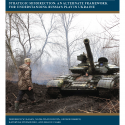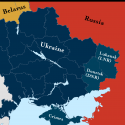Putin's Likely Course of Action in Ukraine - Part 1
Russian President Vladimir Putin is amassing a military force on and near Ukraine’s borders large enough to conduct a full-scale invasion. Western intelligence agencies have reportedly intercepted Russian military plans to do so by early February. Visible Russian military activities and these plans so clearly support preparations for an invasion that it seems obvious that Putin really might invade if his demands are not met.




